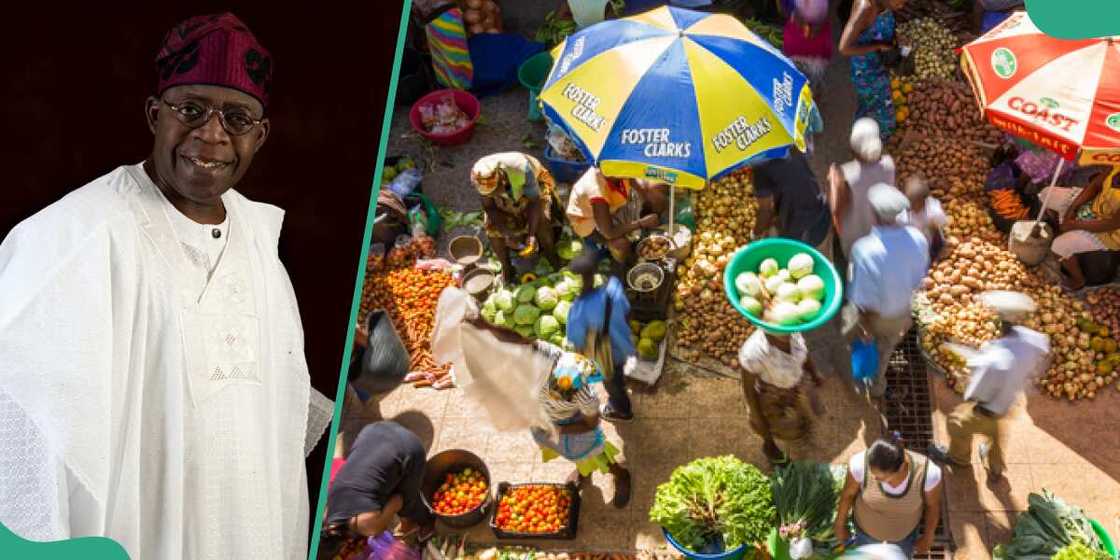Nigeria, Four Other African Countries Control 50% of the Continent's GDP
- IMF data has shown five of Africa’s biggest economies, including Nigeria, contribute a substantial $1.4 trillion to the continent’s GDP
- The remaining 48 countries contribute to the other half, highlighting a stark economic disparity across Africa
- While these major economies exhibit notable growth potential, many other nations face persistent challenges that impede their progress
CHECK OUT: Education is Your Right! Don’t Let Social Norms Hold You Back. Learn Online with LEGIT. Enroll Now!
Legit.ng journalist Victor Enengedi has over a decade's experience covering Energy, MSMEs, Technology and the stock market.
Five of Africa’s biggest economies—South Africa, Nigeria, Egypt, Algeria, and Ethiopia—contribute a substantial $1.4 trillion to the continent’s Gross Domestic Product (GDP).
This is according to data from the International Monetary Fund (IMF), last updated in April 2024.

Source: Getty Images
This accounts for a significant share of Africa's total GDP, which stands at $2.8 trillion.
What is GDP?
According to Investopedia, Gross domestic product (GDP) is the total monetary or market value of all the finished goods and services produced within a country’s borders in a specific time period.
As a broad measure of overall domestic production, it functions as a comprehensive scorecard of a country’s economic health.
Five countries control half of Africa's GDP
The IMF report stated that these five nations alone produce half of Africa's economic output. At the same time, the other 48 countries collectively make up the remaining half, revealing a stark economic disparity across the continent.
A summary of the GDP figures for Africa’s top economies is as follows:
| No | Country | GDP |
| 1 | South Africa | $373.23 billion |
| 2 | Egypt | $347.59 billion |
| 3 | Algeria | $266.78 billion |
| 4 | Nigeria | $252.74 billion |
| 5 | Ethiopia | $205.13 billion |
The sharp disparity between these five countries and the rest of the continent underscores the persistent challenges many African nations face in achieving economic growth and stability.
While these leading economies demonstrate significant potential, other countries struggle with factors hindering their development.
It's also worth noting that data for Eritrea and Western Sahara were unavailable in this report, adding complexity to the assessment of Africa’s economic landscape.
As policymakers and economists examine these numbers, the need for targeted investments and initiatives to address the economic divide becomes clearer.
This report could spark important discussions on promoting inclusive growth across the continent.
Legit.ng had earlier reported that a World Bank analysis titled "Addressing Inequality to Revitalize Growth and Alleviate Poverty in Africa" projected that the ten largest economies drive about 80% of the continent's growth.
In another report, Legit.ng listed the top ten African cities ranging in size from expansive megacities with the highest GDP forecasts for 2035.
Power behind top five
Speaking to Legit.ng about how these top five countries are able to perform this feat, Chukwuma Nsobi, an economic analyst, points out their population size, resource wealth, and strategic economic sectors.
He said:
"Nigeria and Algeria lead as oil-rich nations, with petroleum exports forming a significant part of their economies. This, paired with Nigeria’s large population and consumer market, amplifies its economic influence.
"Egypt, with its diversified economy encompassing tourism, agriculture, manufacturing, and strategic location on the Suez Canal, is vital for trade and investment in North Africa. South Africa’s economy stands out for its industrial base, financial sector strength, and mineral wealth, including gold and platinum.
"Ethiopia, though less resource-rich, has shown remarkable growth with ambitious infrastructure projects, agriculture, and a booming industrial sector, becoming a regional hub for manufacturing and investment."
He said that together, these countries create economic hubs with high investment appeal, strong production capacities, and pivotal roles in intra-African trade and infrastructure development.
Top 10 economic sectors in Nigeria in Q1 2024
In related news, Legit.ng reported that mining & quarrying, agriculture, manufacturing and seven others lead the top economic sectors in Nigeria in the first quarter of 2024.
This is according to the Nigerian Gross Domestic Product (GDP) Report Q1 2024 published by the National Bureau of Statistics (NBS).
Nigeria's Gross Domestic Product (GDP) grew by 2.98% (year-on-year) in real terms in the first quarter of the year.
This growth rate is higher than the 2.31% recorded in the first quarter of 2023 and lower than the fourth quarter of 2023 growth of 3.46%.
Proofreading by James, Ojo Adakole, journalist and copy editor at Legit.ng.
PAY ATTENTION: Сheck out news that is picked exactly for YOU ➡️ find the “Recommended for you” block on the home page and enjoy!
Source: Legit.ng






